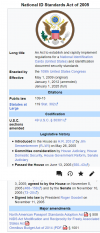National ID Standards Act of 2005, commonly known as the
NIDS Act, was a major act of legislation in the United States that for the first time standardized identity documents nationwide, hybridizing a federal standard known as the National Identification Documents Standard (NIDS) as a national identification card for every American citizen, permanent resident (also known as green card holders) and long-term visa resident. NIDS was paired with the North American Passport Standard (NAPS) to create uniform standards for personal domestic and international identity documents for all current and potential future members of the North American Free Travel Area (NAFTA), one of the major endeavors of President Roger Goodell and his successors of both parties.
Prior to the passage of the NIDS Act, standards for identification had varied widely from state to state, and the standards for border controls between various North American countries was somewhat ad hoc. The terrorism waves of the mid-1990s and again in the early 2000s had threatened to derail conversations in North America about a potential free travel area and passport union, and common standards for ID documents for such a union were regarded as a prerequisite. With multiparty talks on the proposed free travel area largely collapsing after the 2003 bombing campaign by the Fellowship Army and heightened illegal migration thanks to the economic fallout of the 2002 financial crisis, the incoming Goodell administration in early 2005 elected to pursue the NIDS program as a unilateral first step to create a simple, secure process for a national identification card that could be used as a springboard of common document safety standards across North America. The proposal was not without controversy; the small Socialist and Independent Conservatives caucuses both unilaterally announced they would oppose the act on principle, the latter due to their firm opposition to free travel. The initial versions of the act introduced by Representative Mike Castle (L-DE) proposed a single, separate National ID Card that all Americans would be required to apply for, drawing robust opposition from Democrats. A compromise was pieced together from Democratic leaders in the Senate who instead proposed an alternative, suggesting uniform standards for various types of state identification that would be NIDS compliant, tying approval of NIDS into the renewal that same year of the National Voter Registration Act's funding separate from the controversial 2005 omnibus budget. This lost the bill support amongst many conservative Liberals, but it nonetheless passed by healthy margins and was signed into law by Goodell.
NIDS was not without controversy outside of the United States, as upon the resumption of FTAA talks in the 2006 Panamerican Congress in San Juan, Puerto Rico the Goodell administration outlined its intention to use NIDS as a standard for national identification cards in any future free association area, and the adoption of the NAPS Protocol for passports of member states via multilateral agreement between the United States, Mexico, Cuba and Nicaragua in 2008 solidified NIDS as the identity document standard moving forward. Canadian Prime Minister Jack Layton and Quebecois Prime Minister Gilles Duceppe were famously opponents of Canada adopting NIDS/NAPS during the late 2000s and early 2010s despite their maneuvers towards greater economic integration with the United States, though both would be adopted in the mid-2010s by their successors.
View attachment 837845
(All a bit down in the weeds, but hopefully gives a taste of what North America is like in present day with the implementation of a common travel area/passport union, vs. the North America of today which is... definitely not that)
